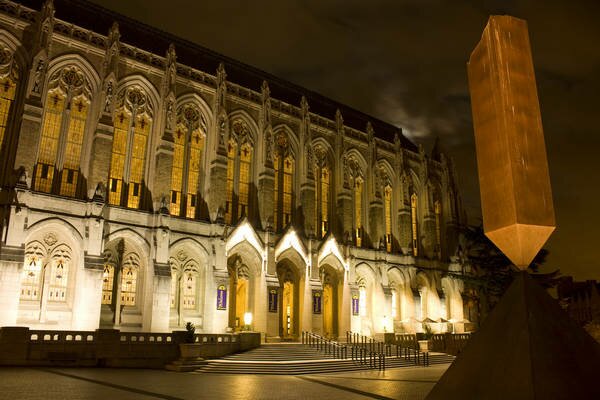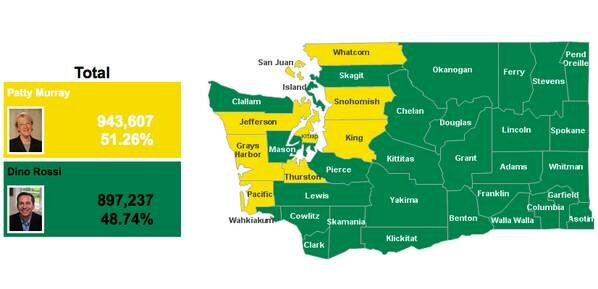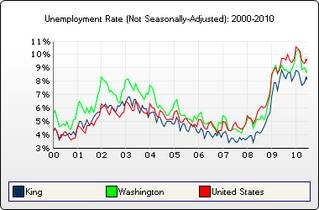 Bloomberg Businessweek has assembled one of those link-bait "Best Blank to Blank in the U.S." lists ("America's Best, Affordable Places to Raise Kids"), which are like...not crack, what's something more credible...um...like bacon cheeseburgers to us, so here you are. As it turns out, the kid-friendliest di tutti citta in the state may be, for our local readers, a shocker.
Bloomberg Businessweek has assembled one of those link-bait "Best Blank to Blank in the U.S." lists ("America's Best, Affordable Places to Raise Kids"), which are like...not crack, what's something more credible...um...like bacon cheeseburgers to us, so here you are. As it turns out, the kid-friendliest di tutti citta in the state may be, for our local readers, a shocker.
The Best Place to Raise Your Kids in Washington state is...Pullman. Ready for the next jab? The runner-up is West Richland. Now, this may not be as remarkable a west-side shut-out as it appears, as to judge from the blurb, the key criteria were "bordering Idaho," "wheat fields," "geographic marvels," and "high WASL scores." Also, "Pullman is a seat of learning and home to Washington State University."
Obviously not every city can be home to WSU, and there's no arguing the wheat field gap with our eastern neighbors. Bloomberg didn't even mention the Giant Palouse earthworm, which we have absolutely no answer to, and which you have to know is like...oh god, not crack again...uh...well, it's like any giant weird creature to kids.
In all seriousness, Bloomberg says they wanted to focus on smaller towns and cities, and not large, urban areas. I suppose that's nice and Norman Rockwell, but really? It seems a substantial assumption that kids are better off getting run over by a wheat combine than the express bus to downtown. Have you ever looked at the kinds of accidents farm kids are prone to? It's gruesome, and nearly always involves losing an arm to a machine. Still, it's a gut-check to realize that Eastern Washington still came out in front on the following:...
 Our Flickr pool's Great Beyond gives us "Broken Obelisk at night"
Our Flickr pool's Great Beyond gives us "Broken Obelisk at night"
The cuts have already come down.
Now they come down again, but this time with more shock, more force, more impact. Straight from Olympia. Tens of millions will be lost in this saga. But the tens of millions tally up to something more profound than cash: the loss of minds. Young minds who want to learn. Wise minds who want to teach.
Our minds, if we let this happen as a region.
The University of Washington, like every kindergarten, elementary, junior and high school and higher learning institution in our country is facing a war of historical dimensions.
What is this war about?
It is about whether we should measure the worth of knowledge and thinking with a calculator. It is about whether a free, thriving and independent learning academy has a place in our society. It is about whether our state and our citizens envision a future where knowledge for the sake of future knowledge is a value....
 Graphic from Washington State Elections
Graphic from Washington State Elections
King County's estimated population is 1.9 million, of which almost 1.1 million are registered voters. Mid-term elections are historically less likely to draw people to the polls, but with all-mail voting, King County doesn't have to draw people anywhere but a mailbox. The result? A new record: 71 percent of King County's voters cast a ballot this year.
That might seem less impressive compared to the 84 percent turnout for the Presidential election in 2008, but it beats 2006's 65 percent, and 2002's 45 percent, handily. The rest of Washington state grumbles about King County "stealing" elections, but the county's impact is thanks to reality's well-known liberal bias: Only 3.6 million of Washington State's 6.6 million residents are registered voters, about 55 percent.
King County, the single most populous county, also has an edge in registered voters, at 58 percent. These marginal differences--in registered voters, in voter turnout--often make the difference. Senator Patty Murray's win this year is a case in point. Statewide, the Murray/Rossi race comes out to roughly 51 to 49 percent, but in King County it's currently breaking 63 to 36 percent, and King Country represents fully one-third of the state's registered voters. (In 2004, King County went for Murray over Nethercutt, 65 to 33 percent.)...
 King County's unemployment rate (ESD)
King County's unemployment rate (ESD)
"State jobless rate drops to 8.9% in July" reads the Seattle Times headline. (Et tu, TechFlash?)
We're a metrics nation (even if that whole metric thing never took off), so it's understandable that people follow numbers closely to see what news they contain. But some people seem to want numbers to deliver action-verb news monthly, even when the economy is clearly stagnating.
When Washington's Employment Security Department announces that "Washington's seasonally adjusted unemployment rate fell to 8.9 percent from June’s upwardly revised level of 9.0 percent," it helps to remember that June's rate was originally 8.9 percent. Comparing unrevised numbers then--apples to apples--absolutely nothing happened.
But something did happen, of course. As ESD's July report states right at the outset, "Washington state, on a seasonally adjusted basis, shed 2,300 jobs between June and July 2010." The ESD news release on July's numbers focuses instead on our anemic but actual private-sector job growth.
The private sector added 3,100 jobs in July, led by 1,000 in transportation, warehousing, and utilities. Construction and education and health services grew by 900 jobs over the month.
Almost 240,000 people were anxiously awaiting their UI checks in July, but a growing number have simply reached the end of that rope. ESD's David Wallace tells me, "Since Congress implemented Emergency Unemployment Compensation in July 2008, the State of Washington has had a total of 15,848 claimants that have exhausted benefits."...
Graph: Washington State Employment Security Dept.
There are likely over 100 headlines about Washington's unemployment rate today that are using some variation of "drops" or "falls," and it's making my head hurt. That's not just because the gains are almost entirely due to temporary jobs added by the 2010 Census (all but 200 of the 8,600 jobs added were governmental).It's because it strains the meaning of the word "drop" to use it in describing a 0.2 percent difference, especially with a measure that wasn't designed to offer that kind of real-time accuracy (monthly results, so breathlessly reported initially, are often revised). It's like our headline writers are all devotees of The Secret.
What is true is that, apples to apples, we're measuring the same rate of unemployment as May 2009, says AP. You might think that a year has gone by with no appreciable improvement, but even that's not true: the state has 27,000 fewer jobs, year-over-year (30,000 less in the private sector). That's the difference between a rate and absolute numbers.
(More fun with numbers: the monthly unemployment rate is derived from a survey that counts people who are "actively seeking work." If you don't have a phone, have given up trying to find a job, were desperate enough to take a part-time or contract position, or have gone back to school to retrain, you're not unemployed.)
Signficantly, you don't find the word "falls" in that AP story's quote from Dave Wallace, chief economist at the Employment Security Department:
[Wallace] cautioned that because of the temporary nature of the Census jobs, "it's a mixed or neutral job picture."
He said in all, the private sector only saw a net gain of 200 jobs, which is "pretty much treading water."
Any bets on how many headlines include that phrase, "treading water"? Other than this post's, I mean? And while the unemployment rate can be said to be treading water, the unemployed cannot.
As the AP reported yesterday, the state is predicting "weak revenue" for the next year and a half (weak to the tune of $760 million), and so the deficit for that time period has grown to $2.6 billion. That said, Publicola is using $11.6 billion--the cumulative deficit amount for the state's budget from 2009 through 2011 so far--as a way of reminding everyone of how far we are from where budget forecasts started. (It's the same story as at the county and city budget level, writ large.)
With the series of cuts necessary to retire last year's $9-billion deficit, the state sliced past fat and into the meat of its social services. Much of the budget is mandatory, "protected" funding, so the legislature can only cut about one-third of the $33-billion biennial budget total. To make up the new $2.6 billion, Washington Budget & Policy Center says, the state would need to cut that one-third by about one-third.
With unemployment across the state at 9.3 percent (it's actually higher in Seattle), and projected to rise, not many people will greet the idea of higher taxes with delight. "The economic downturn has forced more than 60 percent of Puget Sound area residents to delay their retirement plans," says the PSBJ. If slumping consumer spending is driving most of the state's deficit, look for that to continue.
But taxes are what Democratic leadership is suggesting, though since they are looking for options that include their reelection, one likely suspect is sin taxes. Actually, higher liquor taxes prices just went into effect last August, when the Liquor Control Board raised its markup to just over 50 percent.
What we have here is both a failure of leadership and imagination. State and local government spending is hugely important to the economy--one study says that one lost government dollar equates to $1.41 in lost economic activity. Simply put, slashing government spending makes a recession worse, at precisely the time when people need government programs most.
Yet closing "tax loopholes" and soaking the remnants of our middle class isn't going to get the job done, either. I am a long way from knowing what the solution to this particular dilemma might be, but one thing is clear: The current plan--implementing destabilizing cuts in the hopes that the economy is "just taking a break" and will be back soon--is the option of people who have government jobs. And if things worsen, plenty of people now in Olympia may not have them.

Most Recent Comments